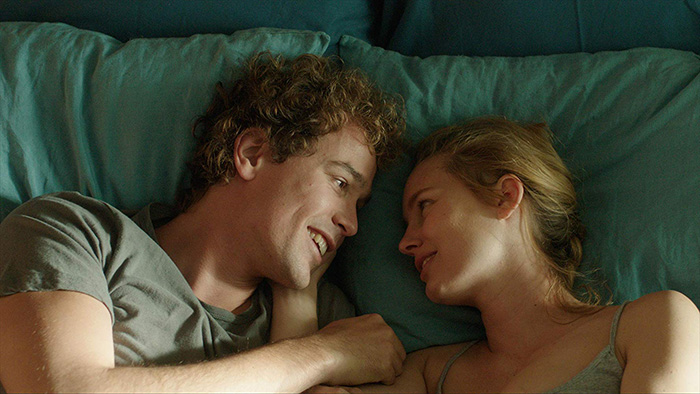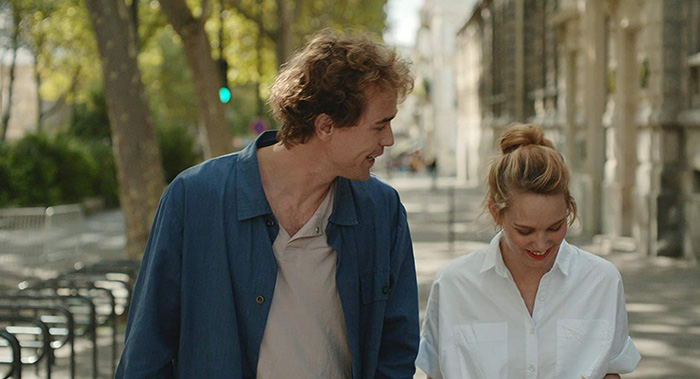Despite opening Online Billie with a glimpse of the titular camgirl (Valentine Payen-Wicaksono’s Esther/”Billie”) engaged in a chat room session, she’s not the lead character. Director Lou Assous and co-writer Xavier Bazoge have very clearly created her as a hypothetical instead—a test with which their surrogate in the story (Baptiste Lorber’s Jules) can confront his biases and wrap his head around the revelation that the woman he’s falling for is a sex worker. This isn’t inherently a problem for the whole considering his journey towards acceptance or rejection of this fact can allow the room for her to defend it, but that’s not what happens here. No, Jules is very clearly safe within the film’s male gaze to earn sympathy and force Esther into shame.
Can she be afraid to open up about this part of her life? Sure. It’s normal to wait to tell him until after their feelings come into focus because Esther neither wants him to think this “bombshell” means she’s only interested in a one-night stand nor him to simply run away. Assous does a wonderful job portraying their whirlwind romance with its fated meet-cute at the Parisian bar where she works (Jules is there for a Tinder date), passionate evening, and following day alone at his mother’s country home. The two have chemistry with authentic looks and genuine happiness in every smile. So it’s unsurprising when Jules returns to her apartment after leaving post-revelation. He can’t let his kneejerk prejudice ruin what might be love at first sight.

The film’s first half is fantastic as a result because it lets their relationship grow regardless of the inevitable conversation to come about what specific sexual things she does for money and whether or not he’s okay it. Even that is handled with nuance as Esther and Jules’ respective fears ramp up their emotions as they each dread the worst. He’s afraid to hear something he won’t like and she’s understandably defensive about hitting that threshold and proving he’s no different than the other guys who see what she does as morally reprehensible. And there’s so much Assous and Bazoge can do with this dynamic since Jules is an aspiring actor learning how to be vulnerable on-stage. If anyone should understand Esther’s job as performance, it’s him.
They don’t ultimately go in this direction, though. The filmmakers instead turn their focus completely towards Jules as though what he’s been betrayed and therefore must become the “bigger person” to go back and start anew. His struggle becomes paramount to hers—enough that we only see her on his computer screen once he signs up for her webcam service to circumvent a phone call (yet he’s the one who stormed out and abandoned her) and understand how far she goes. This is the worst decision that could have been made because it presumes that Esther is fine with Jules leaving. She’s shown as being able to just go back to work (while his life gradually begins to implode). So maybe she wasn’t that attached to him anyway.

But she was! It’s only later when a long-time client declares his love and she rejects him (as though we’re supposed to believe any different after presenting herself as the epitome of professionalism throughout) that we witness the pain she faces from Jules being gone. By that time it’s too late, though. Assous has already done the damage of forcing her wellbeing to take a backseat even though she’s the one who’s been wronged. I have to blame the fact that he didn’t know what a camgirl was until reading an interview with one in a magazine. So rather than appreciate her side, Assous only saw his. It’s, “Could he deal with his lover getting paid for sex?” and not, “Could he give her the respect she deserves?”
Jules’ life falls apart because we’re supposed to empathize with his plight. To do so, however, we must implicitly accept Esther as the cause. She got in his head. She made him fall in love with her before ruining things with her job. She stopped calling him even though I don’t remember ever seeing him try to call her considering he left. Everything is somehow her fault and yet she carries on. Suddenly all the good of their romance is erased by this shift in focus that makes a woman we cared about as much as him or more into a pawn. So when the film’s dark climax arrives moments after finally acknowledging Esther’s suffering, she’s forced to be as humiliated as Jules despite his deception and cowardice.

She’s never allowed to be empowered by her career choice where it concerns her private life. The film holds her work as abnormal (which is weird since America is supposed to be the prude when compared to France) and thus won’t let Esther call Jules out for his bottomless wealth of hypocrisy. Why should it be about him letting her continue and not about her letting him into her life? His hitting this quasi point of rock bottom isn’t to show he was wrong for being a jerk. Online Billie instead uses it to show she seduced him into thinking of nothing else. Her importance becomes tied to his interest—an object he seeks rather than an autonomous human being unless her autonomy can assist his dramatic arc.
It’s too bad because the potential for an interesting story about sex work and society’s bigotry is here. Don’t tell me Assous and Bazoge simply chose another route, though, because the one they picked amplifies all the wrong things to further stain what Esther does as “dirty” while also showing Jules engage in that world as some sort of “hero” to be commended. I can’t get behind that no matter how good those early moments of compassion and heart are or how great Payen-Wicaksono and Lorber are in the roles. The film makes it so that Esther must meet Jules on his affluently privileged terms to earn her happy ending while all he has to do is forgive her “transgression.” The winner: an archaically Puritanical intolerance.
Online Billie played at the Buffalo International Film Festival.

